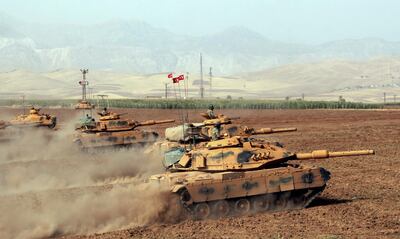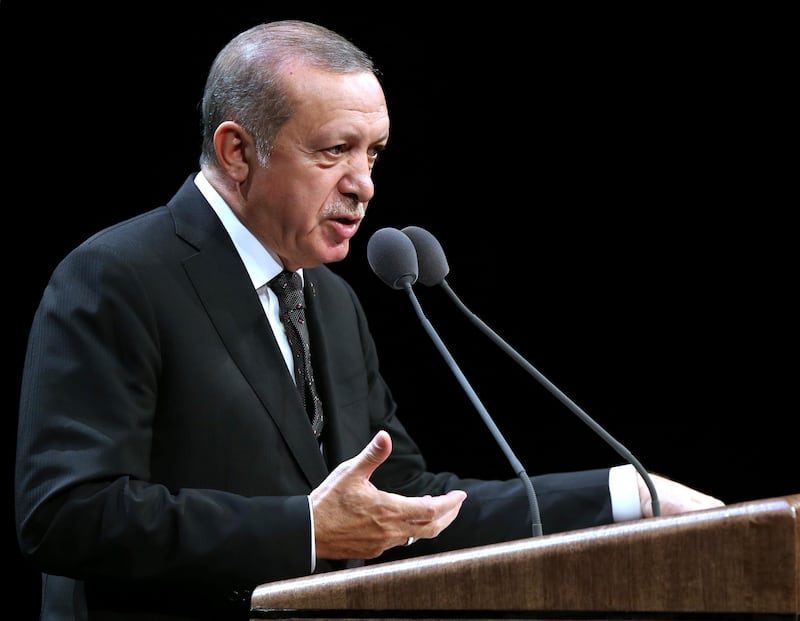Turkey's president on Tuesday warned he would let Iraq's autonomous Kurdish region "starve" with economic sanctions and border closures if the result of its independence referendum threatened Ankara's security.
Recep Tayyip Erdogan said Monday's vote risked sparking an "ethnic war" in the region ahead of the result, which was expected to be announced in the coming hours.
He reiterated that all options, including military ones, were on the table to protect Turkey's security.
It came as Iraqi Kurdish president Masoud Barzani said the region has entered a "new stage" after the referendum and urged Baghdad to open the door to secession talks.
Ankara was fiercely opposed to Monday's non-binding poll, which is expected to deliver a resounding "yes", warning that the creation of an independent Kurdistan could fuel the desire for Kurdish independence within their own land.
_______________
Read more on the referendum:
Explainer: Vote will bolster independence push but non-binding
[ Uncertainty hovers over what happens next to the Kurds of Iraq ]
[ Excitement at polls contrasts with silence on streets ]
Analysis: Vote a smokescreen for Barzani's domestic political woes
_______________
"This referendum decision, which has been taken without any consultation, is treachery," Mr Erdogan said, threatening to cut off the pipeline that exports the Kurdistan Regional Government's oil across the Turkish border.
"It will be over when we close the oil taps, all their revenues will vanish, and they will not be able to find food when our trucks stop going to northern Iraq," Mr Erdogan added.
Widely seen as the world's largest stateless people, Kurds are spread between Iraq, Iran, Syria and Turkey.
Home to approximately 14 million Kurds, Turkey has by far the largest Kurdish population in the region and is battling a three-decade Kurdish insurgency in its south-east.
Iraqi soldiers joined Turkish troops on Tuesday for military exercises in Turkey's south-east, near the border with Iraq's autonomous Kurdish region.

Initial results of Monday’s vote indicated 72 per cent of eligible voters had taken part and that an overwhelming majority, possibly over 90 per cent, had said “Yes”, Kurdish TV channel Rudaw said.
President Barzani, who called the referendum, has said it is not binding but rather meant to provide a mandate for negotiations with Baghdad and neighbouring countries over the peaceful secession of the Kurdish region from Iraq.
But to Baghdad, it threatens a redrawing of Iraq's borders.
The central government in Iraq refused on Tuesday to recognise the referendum.
“We are not ready to discuss or have a dialogue about the results of the referendum because it is unconstitutional", Iraqi prime minister Haider Al Abadi said. Ahead of the referendum, Baghdad asked foreign countries to stop oil trading with the Kurdish region and demanded that the Kurdistan Regional Government hand over control of its international airports and border posts with Iran, Turkey and Syria.
In a televised address later on Tuesday, Mr Barzani told the Iraqi government to stop threatening the Kurds over the referendum and to engage in "serious dialogue".
Iraqi Kurds in particular have enjoyed the most autonomy in region. But they say the referendum acknowledges their contribution in confronting ISIL extremists after the group overwhelmed the Iraqi army in 2014 and seized control of a third of Iraq.
Tehran also voiced its concerns that the vote would trigger "political chaos" in the region, while the Iranian Revolutionary Guard said it was sending new missile equipment to the border.
Like Turkey, Iran fears the vote will embolden its own Kurdish population.
"The outcome of this move is political chaos in the region," Ali Akbar Velayati, chief foreign policy adviser to Iran's supreme leader, said.
Iran banned flights to and from Kurdistan on Sunday.
The United States, meanwhile, said it was “deeply disappointed” by the Kurds's decision to conduct the referendum but added that Washington's “historic relationship” with the people of the autonomous Kurdish region would not change.
“We hope for a unified Iraq to annihilate ISIL and certainly a unified Iraq to push back on Iran," White House spokeswoman Sarah Sanders said.






